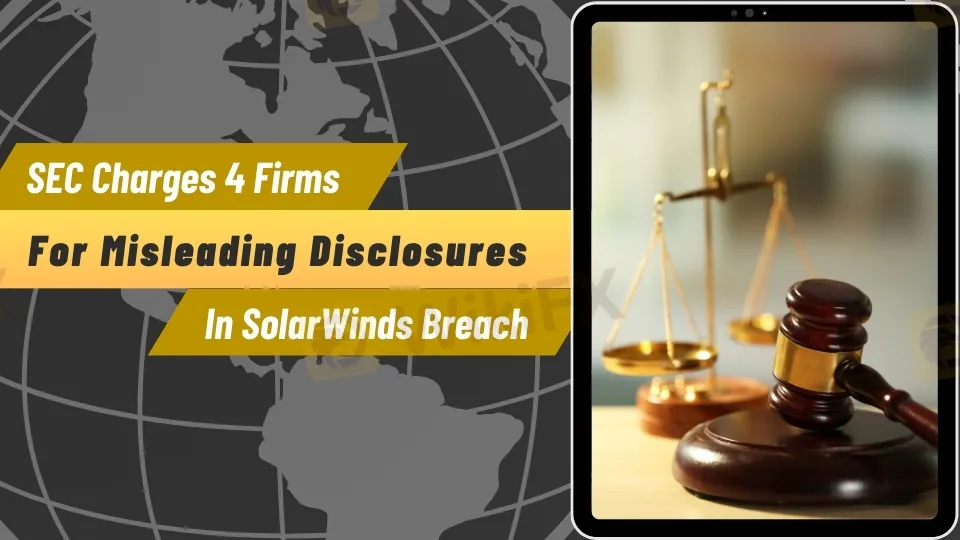简体中文
繁體中文
English
Pусский
日本語
ภาษาไทย
Tiếng Việt
Bahasa Indonesia
Español
हिन्दी
Filippiiniläinen
Français
Deutsch
Português
Türkçe
한국어
العربية
SEC Charges 4 Firms for Misleading Disclosures in SolarWinds Breach
Abstract:SEC charges Unisys, Avaya, Check Point, and Mimecast for misleading disclosures in the 2020 SolarWinds breach. Fines highlight cybersecurity risks and disclosure violations.

The U.S. Securities and Exchange Commission (SEC) has fined four companies—Unisys Corp., Avaya Holdings Corp., Check Point Software Technologies, and Mimecast—for misrepresenting the impact of the 2020 SolarWinds supply chain attack. According to the SEC, these companies misled shareholders and investors about the breachs true extent, marking another chapter in corporate cybersecurity failures.
SEC Fines Companies for Misleading SolarWinds Hack Disclosures
The SECs investigation revealed that these companies failed to disclose the full severity of the SolarWinds hack, which affected thousands of organizations worldwide. Russian state-sponsored hackers had targeted SolarWinds' Orion software, a popular IT management tool, gaining access to many enterprises and government institutions.
The fines, ranging from $990,000 to $4 million, are linked to allegations that the companies downplayed or misrepresented the breach in their public reports. Unisys, for example, was fined $4 million for withholding critical information concerning two SolarWinds-related attacks that resulted in the loss of huge amounts of sensitive data. This was the greatest penalty for violations of their disclosure controls.
Corporate Cybersecurity Failures Highlighted by SEC Investigation
Avaya and Check Point were also criticized for failing to sufficiently warn investors about the dangers of the SolarWinds assault. Avaya first stated that just a small number of emails were viewed, but the SEC discovered that hackers downloaded more than 145 files. Similarly, Check Point, a cybersecurity company, toned down its own breach, giving investors a false feeling of security.
These fines highlight the growing regulatory emphasis on corporate openness in cybersecurity disclosures. The SolarWinds assault, one of the most destructive in recent years, serves as a stark reminder that firms must not only repair breaches but also be transparent with their shareholders.
As cybersecurity events become more common and sophisticated, business executives and compliance officials must improve their reporting mechanisms. With the SEC tightening its regulation of breach reporting, investors and stakeholders are seeking more openness in the aftermath of these big assaults.
The increasing penalties for SolarWinds-related breaches convey a clear message: businesses can no longer afford to conceal cybersecurity flaws or submit deceptive reports.

Disclaimer:
The views in this article only represent the author's personal views, and do not constitute investment advice on this platform. This platform does not guarantee the accuracy, completeness and timeliness of the information in the article, and will not be liable for any loss caused by the use of or reliance on the information in the article.
Read more

Risk Involved with Cabana Capital – Every Trader Should Know
Cabana Capital has changed its name and logo, basically everything about its identity. This seems a bit suspicious, and it's something you should definitely be concerned about. In this article, you’ll learn about the red flags that every trader needs to watch out for.

CME International Records a Massive Jump in Forex Volumes
CME International recorded a record surge in its foreign exchange trading volumes during the second quarter. Check out its performance across products and markets.

Scam Brokers Exposed! FCA Warns Traders to Stay Safe
If you are into forex trading, you need to protect your money from investment scams. Many scam brokers are active in the market now. The FCA, a reputed financial regulator, has issued a list of unlicensed brokers you need to stay away from.

IMF Warns of Global Risks as US Slaps 50% Tariffs on Import
The IMF warns of rising global uncertainty after the US imposes a 50% tariff on copper and Brazil imports. Factories worldwide brace for economic fallout.
WikiFX Broker
Latest News
What is a Pip in Forex?
xChief: A Closer Look at Its Licenses
FXTRADING.com: A Closer Look at Its Licenses
New to Forex Trading in India? Here's How You Can Start and Maximize
Intel spins out AI robotics company RealSense with $50 million raise
Tom Lee's Granny Shots ETF is crushing the market and raking in cash
Risk Involved with Cabana Capital – Every Trader Should Know
XTB Hack 2025: Major Security Breach Exposes Client Accounts
Nvidia's Jensen Huang sells more than $36 million in stock, catching up with Warren Buffett in net worth
These are America's 10 weakest state economies most at risk in a recession
Currency Calculator


